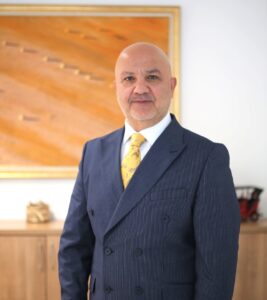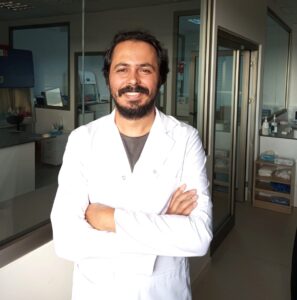
The study, in which Near East University Faculty of Medicine Department of Medical Genetics Lecturer and DESAM Research Institute Researcher Dr. Hasan Hüseyin Kazan participated as a researcher, aims to integrate innovative technologies for the detection of fetal chromosomal anomaly from maternal blood.
Carrying out its research studies with the support of the Presidency of the Republic of Turkey and the Ministry of Health with the mission of supporting innovative and problem-solving projects in the field of health, the Turkish Health Institutes Presidency (TÜSEB), will support the project to develop a screening test that will detect developmental anomalies of the unborn baby, in which Dr. Hasan Hüseyin Kazan is a member of the research team.
The project titled “Digital Polymerase Chain Reaction-Based Non-Invasive Fetal Screening Test Development and Clinical Validation”, for which Near East University Faculty of Medicine, Department of Medical Genetics, Lecturer and DESAM Research Institute researcher Dr. Hasan Hüseyin Kazan carried out the design and writing process, is carried out jointly with clinicians from Gazi University.
Possible disorders in the baby’s development can be detected while it is still in the womb!
In order for the pregnancy process to be healthy, many tests are performed on the unborn baby and the mother. In line with these tests, the course of the pregnancy is determined. Fetal screening test enables the detection of possible abnormal developments in the fetus by scanning the extracellular DNA of the fetus through the mother’s blood. The test, which allows the detection of anomalies in the early stages of pregnancy, stands out as an advanced screening method that does not require surgery. The developed screening test is very important in terms of increasing newborn survival rates and psychologically preparing parents in case of a possible negative outcome.
The project titled “Digital Polymerase Chain Reaction Based Non-Invasive Fetal Screening Test Development and Clinical Validation”, will also prove the effectiveness of digital PCR, a special polymerase chain reaction (PCR) technology, in fetal screening that does not require surgery.

The Rector of Near East University Prof. Dr. Tamer Şanlıdağ emphasized the importance of transforming scientific research into products that will increase the quality of life of the society and improve existing practices in many fields. Prof. Dr. Tamer Şanlıdağ said, “The screening test project, in which one of our lecturers, Dr. Hasan Hüseyin Kazan participated as a researcher with our colleagues from Gazi University, aiming to detect possible anomalies in babies while they are in the womb, is one of the most important examples of this.”
“In order to increase the number of such projects, it is of vital importance to encourage and support multidisciplinary studies and international collaborations,” said Prof. Dr. Şanlıdağ, and emphasized that the project support provided by the Turkish Health Institutes meets a very important need in this sense.

Dr. Kazan said that with the research project supported by the Turkish Health Institutes Presidency (TUSEB), they will integrate the extracellular DNA of the fetus from maternal blood and digital PCR technologies in fetal screening. Dr. Hasan Hüseyin Kazan said, “Through the project, we aim to provide cost and time advantages by producing alternatives to existing fetal screening technologies, thus disseminating these tests.”
“Improving cost and time parameters will pave the way for the widespread use of fetal screenings without the need for expensive technologies and the creation of national screening programs,” said Dr. Hasan Hüseyin Kazan, and added; “With this project, screening programs can be implemented not only in Turkey but also in the Turkish Republic of Northern Cyprus.”